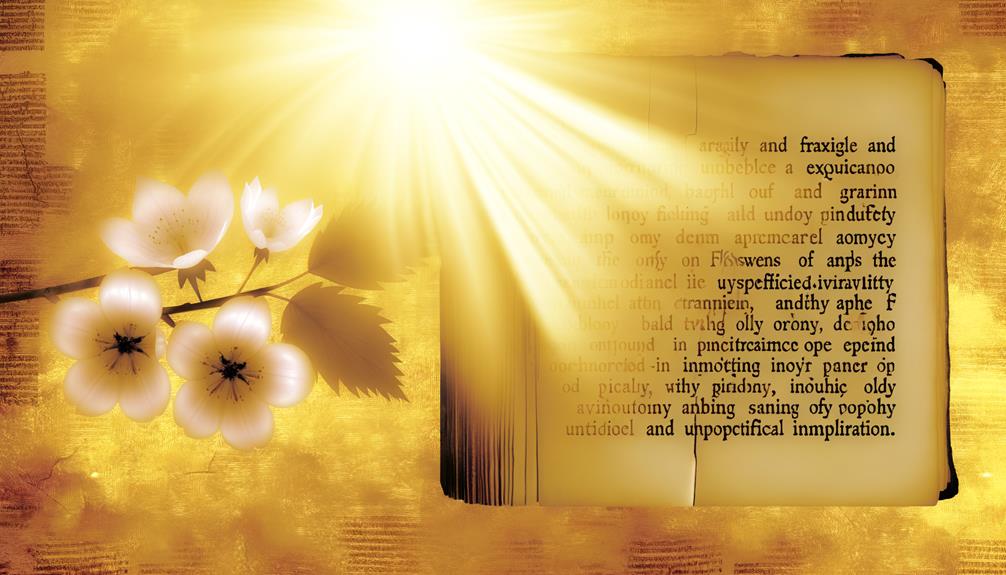Umme Habiba Name Meaning in English
The name Umme Habiba, deeply rooted in Islamic history and Arabic tradition, translates to 'mother of the beloved.' This name comprises two components: 'Umme,' derived from 'Umm,' meaning 'mother,' and 'Habiba,' meaning 'beloved' or 'darling.' Historically, it was borne by Ramla bint Abi Sufyan, a wife of Prophet Muhammad, making it culturally significant within Muslim communities. The name symbolizes affection, respect, and maternal love, reflecting familial values and emotional depth.
For those intrigued by cultural and linguistic significance, further exploration reveals fascinating historical and modern contexts.

Key Takeaways
- Umme Habiba means 'mother of the beloved' in English.
- The name combines 'Umme' (mother of) and 'Habiba' (beloved).
- It was historically borne by Ramla bint Abi Sufyan, a wife of Prophet Muhammad.
- The name signifies affection, maternal love, and respect.
- It reflects deep cultural and religious significance within Islamic tradition.
The Origins of Umme Habiba
Tracing the origins of the name Umme Habiba requires delving into Islamic history and Arabic linguistic traditions. Umme Habiba is historically significant, primarily because it was borne by Ramla bint Abi Sufyan, a wife of Prophet Muhammad (peace be upon him).
Her name holds deep cultural resonance within Muslim communities. 'Umme' translates to 'mother of,' a term of respect, while 'Habiba' derives from the Arabic word 'hub,' meaning 'beloved' or 'dear.' Therefore, Umme Habiba translates to 'mother of the beloved,' reflecting a position of affection and esteem.
This name encapsulates both historical reverence and linguistic depth, offering insight into the cultural and familial values embedded within Islamic tradition.
Linguistic Breakdown
In examining the linguistic breakdown of the name 'Umme Habiba,' we begin with its etymological roots and cultural significance.
'Umme' is an Arabic term signifying 'mother,' while 'Habiba' translates to 'beloved' or 'darling.'
Together, the name embodies both a deep familial connection and an expression of endearment, reflecting its cultural resonance within Arabic-speaking communities.
Etymology and Origin
The name 'Umme Habiba' originates from Arabic, where 'Umme' means 'mother of' and 'Habiba' signifies 'beloved,' collectively translating to 'mother of the beloved.' This compound name is often used in Arabic-speaking cultures to denote a woman with a beloved child, highlighting a maternal connection.
'Umme' derives from the root word 'Umm,' indicating motherhood or origin, while 'Habiba' comes from 'Hubb,' which means love or affection. This name structure is deeply ingrained in Arab linguistic traditions, reflecting both familial roles and emotional bonds.
Understanding the etymology of 'Umme Habiba' provides insight into its linguistic roots, illustrating how names can embody cultural values and relationships.
Cultural Significance
How does the name 'Umme Habiba' encapsulate both linguistic intricacies and cultural values within Arabic-speaking societies?
The name 'Umme Habiba' carries profound cultural significance, reflecting deep-rooted traditions and linguistic nuances.
'Umme' translates to 'mother of,' symbolizing respect and maternal reverence.
'Habiba' means 'beloved,' evoking sentiments of affection and endearment.
Combining these elements, the name signifies:
- Maternal Love: A cherished bond between mother and child.
- Cultural Heritage: A link to historical and familial traditions.
- Emotional Depth: Connotations of warmth and care.
- Linguistic Beauty: The poetic nature of Arabic language.
This name not only highlights personal identity but also embodies collective cultural values, making it a cherished choice in Arabic-speaking communities.
Historical Significance
Given its profound historical roots, the name Umme Habiba carries significant cultural and religious importance within Islamic tradition. Historically, Umme Habiba refers to Ramla bint Abi Sufyan, a revered figure who was one of the wives of the Prophet Muhammad.
Her life and legacy are deeply interwoven with key events in early Islamic history, such as her emigration to Abyssinia and subsequent return to Medina. Her steadfast faith and prominent role among the Prophet's wives have rendered her a significant figure.
The name Umme Habiba, as a result, is imbued with rich historical connotations, symbolizing resilience, devotion, and adherence to faith. It remains a popular name, reflecting a connection to an illustrious past and a respected heritage.
Religious Context
Rooted deeply in Islamic tradition, the name Umme Habiba holds profound religious significance, symbolizing unwavering faith and spiritual devotion.
This name is historically associated with Ramla bint Abi Sufyan, who was one of the revered wives of the Prophet Muhammad (PBUH). Her life embodies the virtues of patience, resilience, and piety, making the name Umme Habiba resonate with spiritual depth and reverence.
Those who bear this name are often seen as inheritors of a legacy rich in religious commitment and moral integrity.
- Faithfulness: Reflecting steadfast loyalty to Islamic principles.
- Piety: Indicative of deep religious devotion.
- Resilience: Emblematic of enduring strength through trials.
- Legacy: Carrying forward a heritage of spiritual excellence.
Cultural Importance
The name Umme Habiba holds significant cultural importance, especially in communities that value Islamic heritage and history. This name embodies not only personal identity but also communal values and historical continuity. It is rooted in the Arabic language and often chosen to honor a revered figure in Islamic history. Therefore, it is imbued with deep cultural resonance.
| Language | Origin | Usage |
|---|---|---|
| Arabic | Islamic | Personal Name |
| Urdu | Cultural | Honorific |
| Persian | Historical | Traditional |
| Turkish | Heritage | Familial |
This cultural significance extends beyond mere nomenclature, representing an intergenerational link to heritage, faith, and communal identity. The name often signifies reverence for historical personalities, thus nurturing a sense of belonging and continuity within the community.
Famous Bearers of the Name
Among the renowned individuals bearing the name Umme Habiba is Ramlah bint Abi Sufyan, a respected figure in Islamic history and a wife of the Prophet Muhammad. Known for her piety and resilience, she played a significant role in early Islamic society. Her life was marked by:
- Unwavering Faith: She embraced Islam despite familial opposition.
- Endurance in Exile: She faced hardships, including migration to Abyssinia for religious freedom.
- Influence in Medina: As a wife of the Prophet, she contributed to the community's spiritual and social fabric.
- Legacy of Compassion: Her actions and character continue to inspire Muslims worldwide.
Ramlah bint Abi Sufyan's legacy underscores the profound impact one individual can have on faith and history.
Popularity Over Time
Examining the historical trends of the name Umme Habiba reveals its enduring significance in various cultural contexts. While the name has maintained a consistent presence over centuries, recent decades have seen shifts in its popularity, influenced by modern sociocultural dynamics.
Understanding these patterns provides insight into how traditional names evolve within contemporary societies.
Historical Name Trends
Understanding the historical popularity of the name Umme Habiba requires an examination of cultural, religious, and social influences over time. Rooted in Islamic tradition, the name gained prominence due to its association with one of Prophet Muhammad's wives, Ramlah bint Abi Sufyan, also known as Umme Habiba. This connection has imbued the name with profound spiritual and cultural significance, contributing to its enduring usage across generations.
- Religious Reverence: The name is a symbol of piety and respect within the Islamic tradition.
- Cultural Heritage: It reflects a rich cultural legacy that has been passed down through families.
- Social Structure: Used often in communities valuing familial and historical continuity.
- Emotional Resonance: Evokes a sense of belonging and identity among its bearers.
This historical context underscores the lasting appeal of Umme Habiba.
Modern Popularity Shifts
In recent decades, the name Umme Habiba has experienced noticeable shifts in popularity, influenced by modern societal changes and evolving cultural dynamics.
Traditionally rooted in Islamic heritage, the name has seen fluctuating usage patterns, particularly among diasporic communities. Factors such as globalization, increased cultural exchange, and the integration of diverse naming conventions have contributed to its variable appeal.
While some regions have observed a resurgence in traditional names as part of cultural preservation efforts, others have seen a decline due to assimilation into broader, multicultural societies.
The name's significance remains potent, encapsulating both religious reverence and familial endearment, yet its contemporary usage reflects broader trends in identity formation and cultural adaptation within an increasingly interconnected world.
Modern Usage
Today, the name Umme Habiba continues to be cherished in many Muslim communities, reflecting both traditional values and contemporary naming trends. Its enduring popularity can be attributed to several factors:
- Cultural Significance: Rooted in deep historical and religious traditions.
- Aesthetic Appeal: Its phonetic beauty resonates across generations.
- Modern Identity: Blends seamlessly with current naming conventions.
- Symbol of Affection: Embodies warmth and love, essential in familial contexts.
Parents often choose Umme Habiba to honor historical figures while embracing modernity. This name represents a bridge between past and present, encapsulating a rich cultural heritage. Its usage today exemplifies how timeless names can adapt, maintaining relevance and emotional resonance within evolving societies.
Symbolic Meanings
The name Umme Habiba carries profound symbolic meanings that resonate deeply within Islamic culture. Derived from Arabic origins, 'Umme' translates to 'mother of,' while 'Habiba' means 'beloved' or 'darling.' Together, Umme Habiba signifies 'mother of the beloved,' a title imbued with affection, respect, and maternal care.
Historically, this name is associated with Ramla bint Abi Sufyan, one of the Prophet Muhammad's wives, revered for her piety and devotion. In a broader cultural context, the name embodies qualities of compassion, nurturing, and spiritual fidelity. It serves as a representation of the enduring values of familial love and respect in Islamic tradition, offering a timeless connection to heritage and identity for those who bear this esteemed name.
Conclusion
To sum up, the name Umme Habiba encapsulates profound historical, linguistic, and cultural layers. Its etymology and historical relevance underline its enduring significance within Islamic tradition.
The appellation's religious connotations and its prevalence among notable figures further underscore its esteemed status.
Over time, the name has retained its cultural resonance, continuing to be embraced in contemporary settings.
The symbolic meanings imbued within Umme Habiba attest to its deep-rooted legacy and continued reverence across various epochs and societies.






